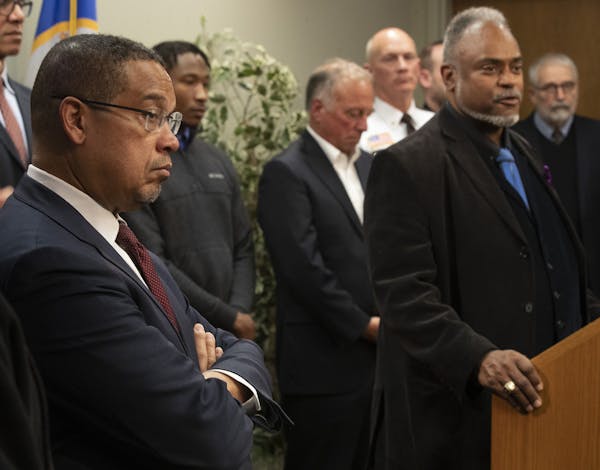They came from all walks of life and many beliefs.
They were reverends and rabbis and people of the Islamic faith. They spoke in Somali, Spanish and English. And they pleaded, at times through tears, for their hurting communities to stay home Saturday night to prevent more pain.
Called together by Gov. Tim Walz, a group of Minnesota community leaders spent nearly two televised hours Saturday morning acknowledging the outrage over the death of George Floyd. In so doing, they also urged people to abide by an 8 p.m. curfew in place across a large swath of the Twin Cities to help put an end to the riots that have traumatized residents.
They decried the presence of rioters from outside the metro area who, under the cloak of darkness, used peaceful protesters as "human shields" to loot and torch drugstores, a post office, auto parts shops and gas stations, and to fire shots at law enforcement officers.
"White people from other communities are coming into my community, our communities as some kind of perverse poetry, as if it wasn't bad enough already," said Justin Terrell, executive director of the Council for Minnesotans of African Heritage.
"Go home now. The fascists on the plane right now, turn around."
Clarence Castile knows how hard it is to ask people to stay home and not take to the streets. His nephew, Philando Castile, was shot seven times by an officer in Falcon Heights in 2016 after insisting during a traffic stop that he wasn't reaching for a gun.
"Riots and protests are needed sometimes so that our state authorities, communities know what we're trying to say," Castile said Saturday. "Those victims who lose their lives because somebody doesn't hear them, it has to be said by someone else in a different way, a stronger and more powerful way."
Yet as Castile drove into work Friday, he saw a plume of black smoke from a burning building rising beyond the highway in south Minneapolis. And it terrified him.
"That's something I've never seen and something I never want to see again," he said. "We have to rebuild our community now."
What started as peaceful protests early last week devolved Thursday and Friday into riots throughout the Twin Cities, bringing destruction to many neighborhoods.
At the news conference Saturday, Walz and state public safety leaders said they were overwhelmed by the number of people who broke the curfew Friday, spreading out across Minneapolis and St. Paul and causing more chaos than law enforcement could handle.
Many of those individuals were encouraged to come to the Twin Cities by national groups across the country, Walz said, capitalizing on the region's discontent to fuel the anarchy.
"The situation in Minneapolis is no longer in any way about the murder of George Floyd," Walz said.
Emilia Gonzalez Avalos, executive director of Navigate MN, said she was devastated when she saw the wreckage on Minneapolis's Lake Street, the "heart of the Latino community" and a hub for many immigrant-owned businesses that now are in ruins.
She said she was encouraged to later see people flood to the neighborhood to help clean up.
"Black, brown, Indigenous, Somali, Mexican, Salvadorans, taking care of the little legacies and the little businesses that are the lifelines in our communities," she said. "But I also saw another story, folks nobody would recognize as our neighbors," who came to "cause more harm and pain in places where there's already harm and pain."
For Lt. Gov. Peggy Flanagan, a member of the White Earth Band of Ojibwe, watching Native American nonprofit MIGIZI in south Minneapolis burn down was particularly painful.
Before she was elected to office, Flanagan was a community organizer for more than two decades, marching in the streets after any fatal police encounter.
"My heart and guts are ripped out right now," she said, because she can't be on streets with her community, mourning at the scene where Floyd pleaded with police for his life.
"That space on 38th and Chicago is sacred ground, and people should be able to come together on that sacred ground and mourn and grieve and demand change and justice," Flanagan said.
"In this moment, we cannot, because there are detractors. There are white supremacists. There are anarchists. There are people who are burning down the institutions that are core to our identity and who we are."
Compounding the situation is the coronavirus pandemic, which has killed more than 1,000 Minnesotans, shuttered businesses and left people emotionally drained, said Mary Merrill of Sabathani Community Center.
"Here we are in a pandemic that we have been dealing with the last three, four months, then on top of that the old disease of racism and hatred reared its ugly head one more time," she said.
Despite that, she pleaded with Minnesotans to stay home, a decision that would help law enforcement separate peaceful protesters from rioters and return the focus to Floyd's memory and the effort to seek justice.
"We're not going to let others come in and change the agenda we've been fighting now for 400 years," she said.

Minnesota State Patrol celebrates diverse new class of troopers

Fired Mpls. teacher accuses management of 'cancerous rot'

Jill Biden rallies women, teachers for the Biden-Harris ticket in Bloomington speeches
Neighbors, city officials at odds over Rochester lake dam

